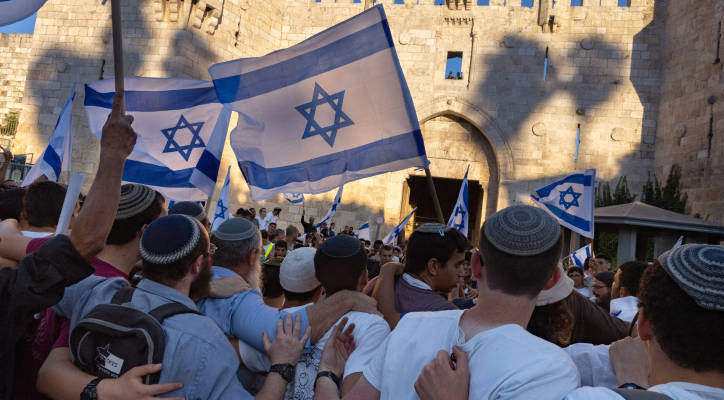This year, when celebrating the joy of Chanukah, we must make it more than a superficial effort and remember those who fought and found the oil to light our way.
By Gary Schiff, JNS.org
Chanukah is a joyous time, as it should be. But many Jews celebrate it superficially, merely by eating latkes and sufganiyot, spinning dreidels and exchanging gifts. While some light a menorah to commemorate the miracle of the last pure jar of oil that lasted eight days, most don’t appreciate the full story of the holiday or its modern-day implications.
Though Jews like to quip about this holiday and others that “they tried to kill us, we won, let’s eat,” the real Chanukah story is one of incredible bravery, commitment, determination and divine guidance to rid the land of the presence of the most powerful army in the world. The echoes of all of the above are present today.
The war of the Maccabees lasted 25 years; it wasn’t some Disney movie. Jews fought bravely, and many were killed.
Here is the background: After the destruction of the original Temple, this was the second attempt at establishing an independent Jewish state in the land of Israel. In the year 198 BCE, the Syrian Greeks defeated the Egyptian Greeks and wrested control of the Holy Land from them.
All was fine for the Jews in Israel until 167 BCE, when Syrian Greek King Antiochus IV Epiphanes comes to power and decided that Jews will have no choice but to adopt the Greek way of life.
He banned circumcision, Torah study, kashrut and Shabbat observance. An idol—a replica of a naked Dionysus, the Greek god of winemaking and religious ecstasy—was placed in the Temple for Jews to worship.
Women were treated as chattel in Greek society. Greek fathers, instead of hoping that their sons would receive an “Ivy League” education, wanted their boys to be adopted by an older uncle and have a physical relationship with him.
To make matters worse, many Jews actively supported the Greeks in their efforts to remove all vestiges of Judaism and live a Greek lifestyle. Judaism was facing the prospect of elimination.
It is against this backdrop that Mattathias (Matityahu) started the Maccabean revolt. There were eight major battles during the first six years of the war. Judah the Maccabee led his guerilla warriors against the Greeks as they were heading from Lod to Jerusalem.
Highway 443, one of today’s two major routes between Tel Aviv and Jerusalem, is actually the famous Beit Horon Ascent, where Judah and his men successfully ambushed Greek troops and forced them to retreat to the coast.
A year later, in 165 BCE, a battle took place that is still studied in war colleges today. During the battle of Emmaus, the Greeks left their encampment in Emmaus (near Latrun) to attack the Jews in Mitzpe (just northwest of Jerusalem) heading up the same Beit Horon Ascent, Route 443.
The Jewish “Mossad” at the time got wind of the planned assault. The Maccabean troops stealthily left Mitzpe and took an alternative route (today’s Highway 1) descending to the Greek army camp in Emmaus. The Maccabees totally destroyed the camp and all its supplies.
In the meantime, not having found the Jews in Mitzpe, the Greek army returned to its base camp in Emmaus. Finding nothing but a smoldering remnant, they were forced to leave Israel and hightail it back to Greece.
To win a 25-year war takes commitment and determination. It was not until 142 BCE that the final vestige of Greek presence in Israel—the Acra Fortress in Jerusalem—was removed. The remnants can be seen in the parking lot at the City of David. (From those battles and the subsequent reign of their successor Hasmonean Kings, one can see plenty of evidence: 40 miles of covered aqueducts that fed Jerusalem with water for 2,000 years, until modern times; protective walls in the Old City; remains of a mikveh [ritual bath] and synagogue in their hometown of Modi’in; Greek encampments destroyed; fortresses, coins and more.)
The Maccabean victory was over Greece, the world’s major military power of the time, was miraculous. Perhaps even more miraculous was the third major successful effort to reestablish an independent Jewish state.
The Modern-day Greeks and Jewish Heroes
The modern-day Greek nations were first the Ottoman Empire and then the British Empire, upon which the “sun never set,” that is, until the British departure from Israel.
Last week, we witnessed the murder of Eli Kay. He immigrated to Israel on his own in his teens; served with distinction in the esteemed paratroopers’ unit; studied in a yeshivah; worked as a tour guide in the Old City; and was engaged to be married. A newly commissioned Israel Defense Forces paratrooper who attended his crowded funeral said that you could sum up the mood in one word, “determination.”
In other words, if you think that terrorists or their sympathizers are going to have even a shred of impact on our will, you are sorely mistaken. This only strengthens our resolve. We are the Maccabees. With God’s help, we have vanquished the world’s largest empires. More of us are coming, and we are building families and our Jewish future right here in the land of Israel.
This year, when celebrating the joy of Chanukah , we must make it more than a superficial effort. Remember those who fought and found the oil to light our way.
Thank God for the miracle of Israel then and now. Commit to support the mission of the Maccabees of today. Support our people and help build the State of Israel.
Gary Schiff is a licensed guide and natural resource consultant connecting Israel and the United States.
Bring Joy to Israeli Soldiers - Send Winter Care Packages!
We are honored to thank the young men and women of the IDF who risk their lives every day to defend the citizens of Israel.
Join us in sending winter care packages and personal notes of support to Israeli soldiers who are out in the cold all day.
Warm up a soldier's heart with essential winter wear including fleece jackets, hats, gloves and more. Keep an entire unit warm!
THE SOLDIERS REALLY APPRECIATE YOUR LOVE AND CONCERN!
Click Here to Send Your Gift and Personal Note to Israeli Soldiers

